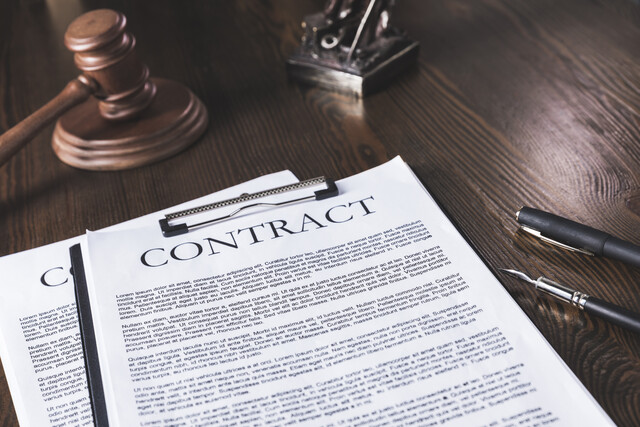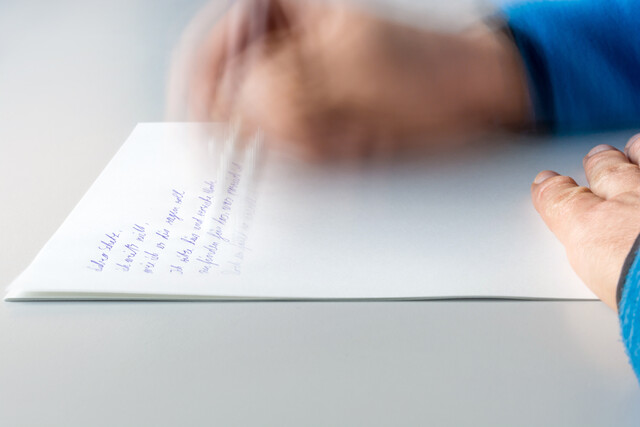|
Writing Techniques for Speed
|
Freewriting
The practice of Freewriting has been used by writing coaches such as Julia Cameron and Natalie Goldberg for years.
The idea is to write as quickly and as freely as you possibly can. For whatever reason, writing instruction has done little to free up the process of writing. By virtue of the fact that it is "instruction" we are immediately aware of all faults and failings as we put words and thoughts to paper.
We are "editing" even before our words reach the page. We worry that we might not be saying things right, perhaps not using the correct argument, that our grammar is incorrect, or that we need to brush up on our spelling.
Think about the act of speaking. We are aware of our audience, and we edit our words before we speak them. With the act of writing, the editing is even heavier because we actually have more time to edit.
This leads to dry, stilted, and very boring writing. We are so worried that we won't do things right, that we turn in something that really is not right, but the teacher or editor or reader can't put their finger on what is wrong!
By practicing Freewriting on a daily basis, you will develop your writing skills far beyond those of most people and writers of this generation.
You will improve because you will have practiced putting down your thoughts, your brief insights, your briefest moments of genius, and they will be there, on paper, and you can go back and find what you're looking for.
The most important point about Freewriting, however, is that it is not to be edited, discussed, or evaluated in any way. This is important! If you edit it yourself, ask someone to read it and discuss it with you, you will be ruining the very reason you attempted the exercise in the first place. You will lose the freedom of Freewriting, because you will begin editing again, just because you know someone else is going to read it.
There is plenty of time for editing later. In fact, the very best writing is heavily edited, but only after the genius of your thoughts has been captured during your Freewriting sessions. It is during the editing process that your writing becomes polished and ready for an audience. It is during the Speedwriting/freewriting sessions that your genius shines through. Both parts of writing are critical, you must understand that you can't do both at the same time.
Here's your assignment:
Freewriting Assignment � To Be Done Five Days a Week
Set aside a time every day to practice your freewriting. You can set a time limit or a page limit, but as you may have never practiced Freewriting for any length of time, you will now Freewrite five days a week.
Get yourself an inexpensive spiral bound notebook for this exercise, and this will be your Freewriting Journal. The only thing to do is to put the date at the top of the page the day you sit down to write, set a timer for ten minutes and begin writing, just as Peter Elbow recommend. Write non-stop for a full ten minutes! Never let your pen/pencil falter.
I recommend writing in pen, especially if you are a perfectionist. A pen will allow you to put one crossthrough if a word is incorrect, but it would actually be better to continue on, even if you wrote the wrong word, write the correct word right after it and keep going.
Here is a screenshot of a page of Freewriting that I did in preparation for this section.
You will see that there is very little editing, there are spelling, grammar, and punctuation errors, etc. I didn't care. I wanted to get down all the ideas I had about freewriting and share them in this portion of the article so that you could see how it is done. For this one, I did type it on the computer, but one thing I do is I close my eyes so that I can't see what I'm typing. Strange things happen when you close your eyes as you type�even the bolding was unintentional, and yet it drew my attention to the idea when I reread it in preparation for this article.
In about ten minutes, I typed out 830 words. The idea here is that you will be 830 words closer to your goal.
Granted, Freewriting does not produce perfectly manicured prose ready for publication. But something students are told all the time, "You cannot edit a blank page!" So, get something down, use the material for your project, and before you know it, you will have plenty to edit and plenty to turn in to your editor or instructor.
The most important point to remember about the exercise of Freewriting, editing and creating can never be done at the same time. Allow for the creation of something�afterward you can edit. It is editing when you create that causes all the problems.
Guided Writing
As another exercise to "mine" the information in your head, Guided Writing is very similar to Freewriting, except you are given a topic to write about. You can choose from a list of topics that I'll provide at the end of this section, or you can make your own list of topics that are more pertinent to what your current writing issues are.
The idea, again, is to set a timer, and write for at least ten minutes. Most of the time I shoot for between 10 and 15 minutes. Gradually, you will increase this to 30 minutes, then 45, and possibly even up to an hour. Do you have any idea how many words you can write or type in an hour if you were to completely free yourself from the idea of editing as you wrote?
The practice of Freewriting and Guided Writing will break through any case of Writer's Block you may have. Most of the time, Writer's Block is because we have actually talked ourselves out of our ability to write about a given topic. This is where Guided Writing comes into play.
Again, for the purposes of this class, I did a ten minute guided writing on the topic of Writer's Block. What I remembered (during the writing process) is that rather than just giving yourself a topic, turn it into a question.
For example, I wanted to write about Writer's Block. During my freewriting session on this topic I remembered to rephrase it to:
"What is the biggest problem with Writer's Block do you have? When does it appear? How long does it last? What do you do to get around it?"
This came directly from my freewriting experience without any editing. Read the selection below to see how I remembered it. This is the beauty of freewriting and guided writing exercises.
Asking questions is critical to the writing process. The more questions you ask yourself, the more your brain tries to answer them. When that happens, you will find that you have a whole lot more left to write when your time is up.
Hmmm�what happened to that Writer's Block problem? As you can see, Writer's Block is really nothing more than a state of mind. It occurs when the project you need to tackle is too large to be done in one session. Or, it occurs when you haven't asked yourself a question. Or it occurs when you are allowing your Internal Editor to take control of your thoughts.
Here are some Guided Writing topics for you to try in the next few weeks:
- "What is the biggest problem with Writer's Bock do you have? When does it appear? How long does it last? What do you do to get around it?"
- "What is your greatest fear in writing? Do you ever fear you will be wildly successful? If so, talk about what could happen that is so frightening."
- "Is there a part of this writing project where I just feel stuck? Am I avoiding it for some reason? Is there a deeper meaning to it that concerns me? How can I get around it?"
- "Why am I resisting the process of writing? Am I resenting the time it takes away from _____ (fill in the blank)? How can I get my writing done and still make time for ____?
- "Why do I have time for my friends, my family, cleaning windows, even the bathroom floor with a toothbrush, and yet I can't seem to make time for my writing? Do I really hate writing? Do I love writing, and yet fear that it may consume me?
"Have I made writing a priority in my life? I tell everyone how important it is to me, but I don't seem to find time for it. How can I put my writing before everything else? I wonder how I can get my writing done first, and still do all the things I'm doing. Is it possible?"
Writing for Progress (As If)
In order to make progress in your writing, you have learned not to edit as you write. But how do you continue to make progress when you begin editing and you find something that has to be changed? What do you do? What techniques can you use that will help you to remember the issue, but not allow you to lose the steam you've built up with the progress you are making?
- Research the difference between regular strawberries and alpine strawberries.
- Find out why you can only make strawberry tea from fresh or completely dried strawberry tops.
- Change the order of the chapters to reflect the "how to" portion first, and the more in-depth examples later.
One problem writers have is that when they begin even minor editing, suddenly one change means a whole lot of changes need to be made, and that impacts the effort you're putting in right now.
In order to maintain your momentum, and to stay on track with what you hope to accomplish during this writing session, have an editing page where you make note of the change that needs to be made, and then continue on working as if that change has already been made!
Why does this work? Because you can take care of that nagging voice inside your head that is saying, "Hey! You! If you don't take care of this, your entire piece of writing is going to be horrible!"
But, if you can then reply, "Don't worry, I've made a note and I'll take care of it when I go through for the next edit."
Your Internal Editor will have to meekly subside, be quiet, allow you to do what you're doing � which is writing! Then you can continue to do your work without any more internal interruptions! Now doesn't that sound like a miracle?
If you can learn to handle, then silence your internal editor, learn to create without judgment or concurrent editing, your writing sessions will become light-hearted and fun once again. You'll remember why you enjoyed writing in the past!
Remember This�
Anything you create with a freewriting exercise, even a guided freewriting exercise is not a completed and polished bit of writing. It still needs to be edited, polished, and edited again before you're ready to "publish" your work, in whatever form you intend to publish it.
Remember, you can't edit a blank piece of paper�with these methods you are no longer staring at a blank piece of paper.


























